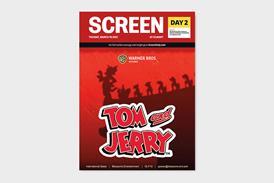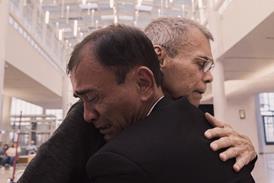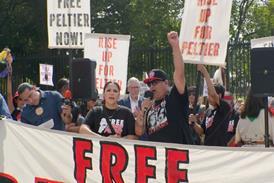Northern Ireland’s production scene has been expanding rapidly thanks to major projects such as Game Of Thrones. Sarah Cooper looks at how the territory is continuing to grow its infrastructure and crews, while building up its local film-making industry.
It is testament to how far Northern Ireland has come as a filming location that last summer the territory not only played host to season four of HBO’s Game Of Thrones but also managed to accommodate a Bollywood feature, an indie sci-fi film, a BBC TV drama series and a large-scale Hollywood fantasy feature.
“The fact they were able to survive alongside Game Of Thrones is a really big statement and evidence there is beginning to be a real depth of crew in Northern Ireland,” says producer Aidan Elliott of Belfast and London-based Generator Entertainment, which was set up by Mark Huffam and Simon Bosanquet in 2008 to produce a mix of international and local projects including Cherrybomb and Whole Lotta Sole.
“It feels to me that outside of London this is the strongest film industry in the UK,” adds Elliott, who together with Huffam is teaming with Microsoft Entertainment and Scott Free Productions for Sepia (working title), a large-scale digital feature project based on Xbox’s videogame Halo, which will shoot in Belfast and the surrounding area this month, directed by Sergio Mimica-Gezzan.
“We looked at shooting in New Zealand, Morocco and South Africa but when it came down to it, the best value for money is actually in Northern Ireland, where you can get the tax credit and funding from [regional agency] Northern Ireland Screen. I don’t think you can beat that anywhere else in the world for production value and making money stretch,” Elliott explains.
‘There’s a reason why Northern Ireland has the most successful screen industry outside London - they were the first across the finishing line’
Mark Huffam, Generator Entertainment
Similarly, Universal had originally planned to shoot its epic fantasy feature Dracula Untold — starring Luke Evans and Dominic Cooper — in eastern Europe, before realising that, financially, it made more sense to come to Northern Ireland.
“They sent me costs for Romania and I showed them that they could do it more effectively in Northern Ireland,” explains Huffam, who with his strong international connections has played a crucial part in attracting a string of large-scale productions to the region including Playtone’s City Of Ember, Universal’s Your Highness and HBO’s Game Of Thrones, which Sky Atlantic broadcasts in the UK.
Tempo Productions’ Piers Tempest has regularly chosen to produce projects in Northern Ireland rather than mainland UK, including Killing Bono, Grabbers and most recently Jon Wright’s Robot Overlords, starring Gillian Anderson and Ben Kingsley, which shot in Northern Ireland last summer and is being sold by Embankment Films. The next instalment in Wright’s planned monster trilogy, Robot Warlords, will also shoot there in 2015.
“You are always thinking about what’s going to produce the best production value for the budget, and a pound spent in Northern Ireland goes much further than elsewhere in the UK,” says Yorkshire-based Tempest, who admits that with the one-hour flight to Belfast from Leeds, “it’s quicker for me to get to Belfast than it is to London”.
Growing infrastructure
“There are very few high-end TV shows and films that don’t mention Belfast when they are talking about locations,” says Greg Darby, founder of post-production house Yellow Moon, which having worked on projects including Line Of Duty, Game Of Thrones and Dracula Untold is one of a number of local companies to benefit from the influx of productions to the territory.
“We’ve just moved into our fourth building in five years,” says Darby, who is optimistic the growth in production activity will continue, especially with the recent enhancements to the film tax credit, which are expected to attract more international projects to come to the UK to carry out their post work.
Until recently, one missing piece of the puzzle was the presence of a high-end VFX company in Northern Ireland but that gap has been filled by Soho-headquartered Nvizible’s Belfast office, which opened in April, after merging with local outfit Factory Pictures.
“Northern Ireland could provide anything for high-end feature film and TV apart from digital effects, so that’s where we came in,” explains Victoria Farley, who heads Nvizible’s Belfast office, which currently consists of eight local VFX artists who are being trained up by the company’s Soho team.
The territory’s ever-growing crew base is thanks partly to the consistent presence of Game Of Thrones, which employs up to 400 crew members per season, and as part of Northern Ireland Screen’s paid-placement scheme, is obliged to take on a certain number of local trainees each year across its departments.
“Big productions like Thrones and Dracula Untold have started to attract quality talent to Northern Ireland, which traditionally might have ventured to the UK or US. It means we can make the whole film there with really fantastic crews and great line producers,” explains London-based producer Wayne Marc Godfrey, who is working on two Northern Ireland-set projects, Stephen Fingleton’s The Survivalist and A Patch Of Fog, written by local writers Michael McCartney and John Cairns.
Fingleton, a 2013 Screen International Star of Tomorrow, is one film-maker who has chosen to move back to Belfast from London to capitalise on the growing opportunities in the region. “You will find a lot more film-makers and crew going to live in Northern Ireland to match the expansion and my advice to anyone looking to break into the industry would be to move to Belfast because there’s such a huge demand for people with a hunger to succeed,” says the director.
Together with its focus on training and development, Northern Ireland Screen’s CEO Richard Williams sees “making marriages” with international companies as key to building up the territory’s indigenous industry, as well as trying to entice producers and directors to set up in Belfast. Lisa Barros D’Sa and Glenn Leyburn’s 2013 critically acclaimed punk biopic Good Vibrations, for example, was produced by Belfast-based Canderblinks alongside with London-based Revolution Films.
As well as David Mackenzie’s Starred Up — which shot at Crumlin Road Gaol in Belfast — this year will see the release of several high-profile projects out of the region, including Shooting For Socrates, about the Northern Ireland football team making it to the 1986 World Cup finals, written by award-winning Northern Irish writer Marie Jones, directed by James Erskine and starring John Hannah (sold by Metro International); and Liv Ullmann’s period feature Miss Julie starring Jessica Chastain and Colin Farrell, which shot in Northern Ireland last spring (sold by Wild Bunch).
Also set for release is feature documentary Road, about motorbike racers Robert and Michael Dunlop, produced by local company DoubleBand Films and narrated by Liam Neeson. The film, which was backed by Northern Ireland Screen and the BBC, recently opened the 14th Belfast Film Festival.
Road is DoubleBand’s first venture into the world of feature documentaries, having previously established itself as a TV documentary company — a move that illustrates the growing ambition among some of the local industry’s key players.
“It’s a story set in our backyard but one that can also translate to an international audience,” explains DoubleBand’s Michael Hewitt of the project, which is being sold internationally by The Works International, and is being distributed in the UK and Ireland by Kaleidoscope.
The company, which was set up by Hewitt and Dermot Lavery in 1988, is also on the point of acquiring rights to a book that centres around jazz music and the First World War that has “no connection to Northern Ireland in terms of subject matter”.
“We are becoming increasingly internationally focused,” adds Hewitt.
There has also been a recent swathe of high-end TV dramas shooting in Northern Ireland, including Belfast-set BBC series The Fall, which has just filmed a second series in the city, and hit BBC police drama Line Of Duty, as well as London-based Mammoth Screen’s PG Wodehouse period drama Blandings, which returned to shoot a second series at Crom Castle in County Fermanagh in November. Blandings is the third Northern Ireland-based production for Mammoth Screen, which set up an office in Belfast in 2009.
Meanwhile, the territory continues to attract interest from large-scale US TV productions following the introduction of the UK’s high-end TV tax credit, which was, according to Huffam, “largely driven by the Game Of Thrones model”.
“Westminster took the lead from here and there is a reason why Northern Ireland has the most successful screen industry outside London — because they were the first across the finishing line,” he says.
With the global hit Game Of Thrones already confirmed to shoot season five in Belfast, it is only a matter of time before more productions come rolling into town. The question now is, can Northern Ireland keep up?
Huffam thinks so: “There is still a great enthusiasm for the film industry here and a great energy. The infrastructure is growing all the time but there is still plenty of room to get bigger.”
























No comments yet